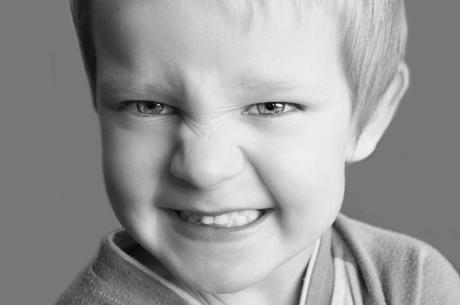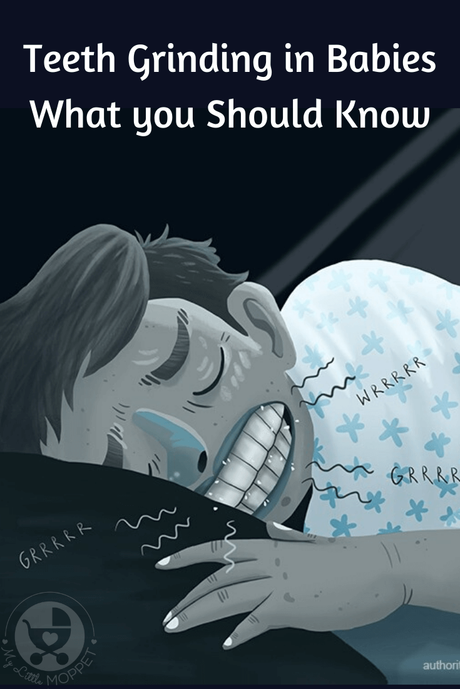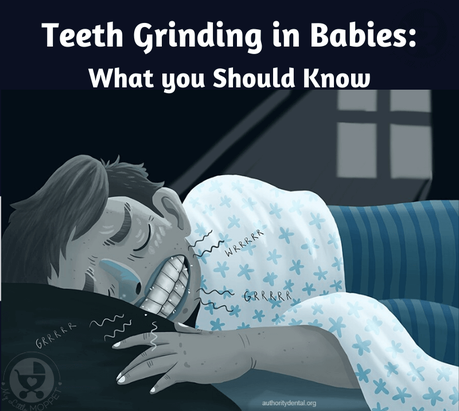December 17, 2019 Leave a Comment
Teeth grinding can be very annoying but is it dangerous? Find out more about teeth grinding in babies and toddlers – causes, signs and ways to fix it.
Some sounds can just transform you into another world. Rain falling on the roof, the sizzle of something frying or a song from your childhood – these are all pleasant sounds. But some sounds can have the opposite effect; have you ever heard fingernails scratch on a chalkboard? Well, that is something that can make your nerves tingle, and a close second is the sound of someone grinding their teeth!
Many parents get all worked up when they hear their child grinding their teeth all night. The sound, especially in the silence of the night, can seem ominous, which makes the parents’ worry understandable. But what exactly is teeth grinding, and why does it happen?
What is teeth grinding?

Teeth grinding, medically known as Bruxism, is a condition where a person grinds their teeth, often resulting in an unpleasant, grinding noise. Bruxism occurs in babies, children and adults. It happens all through the day, although most teeth grinding incidents occur at night, during sleep. This is also called sleep bruxism. The reason bruxism occurs mostly during sleep may be because children have no muscle control in their mouth while sleeping.
Worldwide, 1 in 3 people suffer from bruxism, most commonly seen in babies and young children. About 33-38% children grind their teeth, usually till the age of 6-7 years. Bruxism can be identified by the following signs:
- A loud grinding sound
- Clenching of the jaws
- Pain or tenderness in the jaws, especially in the morning
- Earache
- Headache, especially near the temples
- Pin during chewing
- Damaged teeth
Reasons for Teeth Grinding
The exact reason for teeth grinding is still unknown, and in most cases, it is just a natural part of growing up. Unlike what many people think, teeth grinding isn’t because of nightmares. Here are some of the most common reasons your child may be grinding his teeth.
1. Stress. Stress is a valid cause for teeth grinding, particularly in older kids. Stressful incidents like exams, moving to a new home or relationship issues can cause bruxism.
2. Teething. Many parents notice that babies start grinding their teeth just about the time they’re cutting their first tooth, around 5-6 months of age. Teeth grinding also makes a reappearance when kids are getting their permanent teeth, around 6-7 years of age.
3. Malocclusion. This is a medical term for a misalignment between the top and bottom teeth. This can cause teeth to grind their teeth involuntarily.
4. Pain. Just as we may rub a body part when it’s sore, children may grind their teeth in response to any kind of pain, like an earache.
5. Caffeine. Too much caffeine consumption in the form of chocolate, iced tea or soft drinks can cause an increase in teeth grinding.
6. Medical Conditions. Children who have developmental issues or medical conditions like cerebral palsy may have bruxism. Sometimes, it can occur as a reaction to certain medicines.
7. Breathing Issues. Some experts find that when children suffer from a cold or breathing problems like congestion, allergies or stuffiness, they may be prone to teeth grinding. There are opinions that teeth grinding may be linked to worms, but there is not sufficient research to prove this. Some doctors also suggest that it could point to a problem with the central nervous system. Children are more likely to grind their teeth if either parent does so. Kids who talk or drool in their sleep are also more prone to bruxism.Teeth Grinding in Babies – What to Do

Bruxism is considered harmless, and in majority of cases children outgrow it naturally. The teeth grinding is usually a bigger problem for the child’s family, who have to listen to the grinding sound! Sometimes, hard grinding of the teeth can cause headaches or a wearing down of the tooth enamel. In severe cases, it can cause temporomandibular joint disease (TMJ), a condition that occurs from continuously clenching the jaw. Here are some ways to prevent or control teeth grinding in babies and kids.
1. Since one of the main causes for bruxism is teething, try some home remedies for teething, like offering teething toys or teething biscuits.
2. Try a relaxing bedtime routine for babies, like a warm bath, soothing music, reading and lots of hugs.
3. Avoid high-caffeine foods in your child’s diet, like colas and chocolate.
4. If your child chews gum, it’s best to discourage that habit, since the excessive clenching of the jaw during chewing can increase the likelihood of teeth grinding.
5. Anxiety and stress is another major cause of teeth grinding in older kids. These can be dealt with by talking to the child directly and sorting out their issues.
6. Before bed, it helps to relax the jaw muscles by holding a washcloth dipped in warm water close to the cheek.
7. Dehydration may also cause teeth grinding, so ensure enough water in your child’s diet.
8. Some parents find that pacifiers help with the sound of teeth grinding in babies, but it’s important to prevent it from becoming an addiction.
The best way to keep your baby’s teeth in proper condition is to have regular dental visits, starting with when the first tooth appears. Teeth grinding usually disappears once the teeth have come in. In case of stress-induced bruxism, the grinding stops when the source of stress goes away.
If your older child continues to grind her teeth even after the permanent teeth have come in, it may help to get a special mouth guard that will protect the teeth from damage. If the teeth grinding is accompanied by snoring or choking or gasping during sleep, see your doctor right away to rule out sleep apnea, a sleep disorder that can be dangerous.

Featured Image used from Authority Dental according to Creative Commons License
Buy Homemade Baby & Toddler Food from a Doctor Mom's KitchenOrganic · FSSAI Certified · NABL Lab certified Buy Sprouted Sathumaavu Health Mix powder for Babies / Homemade Cerelac Dry Fruits Powder for Babies/Toddlers Pancake Mixes for Toddlers TweetPinShareWhatsAppEmail
Filed Under: Baby, Dental Health, Health, Parenting Tagged With: baby health, bruxism, health, health tips, parenting, parenting tips, teeth, teeth grinding, teething, teething remedy
